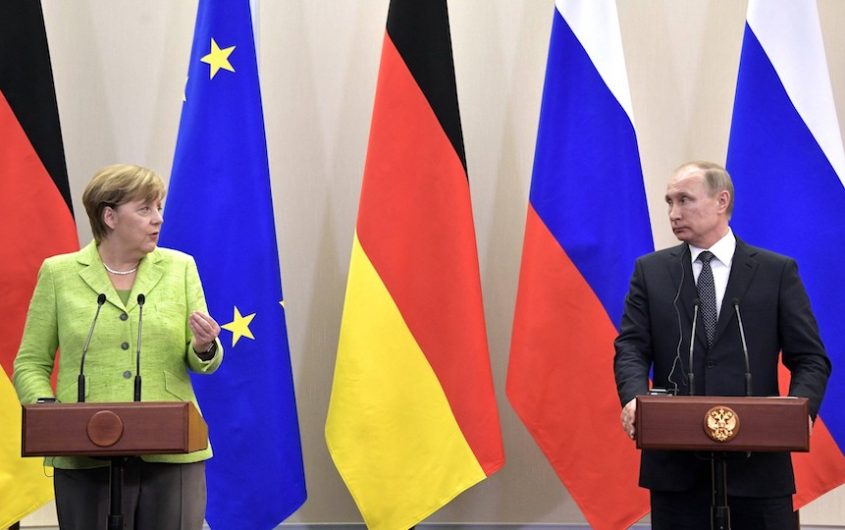
The Russian Presidential Press and Information Office, via Wikimedia Commons
Angela Merkel’s Russia Legacy

Stephen F. Szabo
Senior Fellow
Dr. Stephen F. Szabo is a Senior Fellow at AICGS, where he focuses on German foreign and security policies and the new German role in Europe and beyond. Until 2017, he was the Executive Director of the Transatlantic Academy, a Washington, DC, based forum for research and dialogue between scholars, policy experts, and authors from both sides of the Atlantic. Prior to joining the German Marshall Fund in 2007, Dr. Szabo was Interim Dean and Associate Dean for Academic Affairs and taught European Studies at The Paul H. Nitze School of Advanced International Studies, Johns Hopkins University. He served as Professor of National Security Affairs at the National War College, National Defense University (1982-1990). He received his PhD in Political Science from Georgetown University and has been a fellow with the Alexander von Humboldt Stiftung, the Woodrow Wilson International Center for Scholars, and the American Academy in Berlin, as well as serving as Research Director at AICGS. In addition to SAIS, he has taught at the Hertie School of Governance, Georgetown University, George Washington University, and the University of Virginia. He has published widely on European and German politics and foreign policies, including. The Successor Generation: International Perspectives of Postwar Europeans, The Diplomacy of German Unification, Parting Ways: The Crisis in the German-American Relationship, and Germany, Russia and the Rise of Geo-Economics.
A Tightrope Walker Reaches the End of the Rope
Former Chancellor Angela Merkel made her first public appearance since leaving the Chancellery recently with an extended interview in the famed Berliner Ensemble, once the theater of Bertolt Brecht. A relaxed and unapologetic Merkel tried to make the case that Putin’s war on Ukraine was not her fault. Is she right?
Her argument, “I don’t blame myself. I have tried to work in the direction of preventing mischief. And if diplomacy doesn’t succeed, this doesn’t mean that it was therefore wrong. Thus, I don’t see why I should say, ‘That was wrong.’ And therefore, I won’t apologize.” She also defended her decision not to agree to Ukrainian membership in NATO at the 2008 NATO Bucharest summit, contending that Ukraine was “not a democratically consolidated country,” and NATO membership would have led to certain war. She also said she had “at no time given in to illusions” that Germany’s Wandel durch Handel (change through trade) policy would really change Putin’s behavior. “I was not naive,” Merkel insisted, arguing that she repeatedly warned that Putin “wants to destroy the EU because he sees it as a precursor to NATO.”
She has a case regarding NATO enlargement in 2008, as Putin may well have gone into Ukraine instead of Georgia then. However, in her usual compromising approach, she agreed to language stating Ukraine would be a NATO member in the future, which only postponed a reckoning. President Obama turned over the management of the Ukraine crisis to her, believing that this was a European matter and that the United States should not allow the Europeans to free ride on American power. He, along with Merkel, refused to send heavy weapons to help arm Ukraine. She therefore had to make the best of a bad situation with very limited American support. The best that she could do was to come up with a temporary solution, the Minsk accords. As there was no appetite in NATO to do more, it was a clearly provisional outcome, a way to buy time and the sanctions she imposed have had a continuing cost for the German economy.
It is in the follow-up where Merkel failed as a leader. She did not use the time available to make the case for a strong military in her own country and in broader Europe. Although German defense spending rose incrementally after Russia’s annexation of Crimea, the state of the Bundeswehr’s equipment and readiness remain abysmal as indicated by the reports of the Bundestag Commissioner for the Bundeswehr. She allowed Germans and Europeans to continue to sleepwalk while Putin only increased repression at home and violence abroad. She tolerated the assassination of a Chechen dissident in the heart of Berlin, stated her displeasure over Russian hacking of the Bundestag and her own computer without any actions to punish the hackers, and gave Navalny medical treatment in Berlin, but she did not change her persistent diplomacy with Putin.
[Her relations with Putin] reflected the German preference to do business, hope for the best, and let America and others take care of strategic issues, believing military force was a thing of the past.
As a result, the German armed forces are in a weak position and require years of renewal to become a credible deterrent to Russian aggression. Despite her reservations, she continued to build up the economic relationship with Russia, now confessing that this was done for purely economic reasons with no expectation of political liberalization or diplomatic accommodation. Even worse, her hasty decision following the Fukushima nuclear disaster to accelerate the exit from nuclear power increased German dependency on Russian energy while her willingness to go along with the Nord Stream 2 gas pipeline provided Russia with an alternative to the Ukrainian route, making an invasion of Ukraine less costly to Russia. It is no accident that the Russian invasion occurred only after the completion of the pipeline. Her explanation, “You cannot ignore each other completely.”
This approach was consistent with her personal worldview as pointed out by Fintan O’Toole in a recent essay reviewing Kati Marton’s biography of Merkel. As O’Toole writes, “she once described herself as being as focused and as concentrated as a tightrope walker only thinking about the next step, but that exclusive focus on thinking about the next step also meant that she had little sense of what might await at the end of the rope. Nowhere was this more true than in her relations with Putin.” This also reflected the German preference to do business, hope for the best, and let America and others take care of strategic issues, believing military force was a thing of the past.
Her emphasis on diplomacy with Putin and her many conversations with him may have made matters worse rather than better. As she pointed out in her interview, “The military is the only language he understands.” In other words, the continuing diplomatic outreach to Putin by her, Macron, Scholz, and others is seen in Moscow as a sign of weakness and division encouraging further aggression. This error was compounded recently by Scholz’s chief foreign policy advisor, Jens Plötner, who made the case that German media should focus more on Germany’s future relationship with Russia than on supplying Ukraine with heavy weapons. While Scholz walked this back, it is another example of the indecisiveness of the policy.
There was more to Merkel than Russia and she was not alone—remember Londongrad and Donald Trump—but with Germany being more consequential than other European states when it came to Russian policy and European defense, her acquiescence to public opinion was damaging beyond Germany. As Constanze Stelzenmüller just pointed out, she was a politician of her time reflecting the public mood and, as a result, left her job as one of the most popular chancellors in German history, something she noted with pride in her interview. Still, at the end of the day, her case is unconvincing. Like most contemporary politicians, she refuses to accept responsibility for her actions and has left it to her successors to deal with her legacy.








